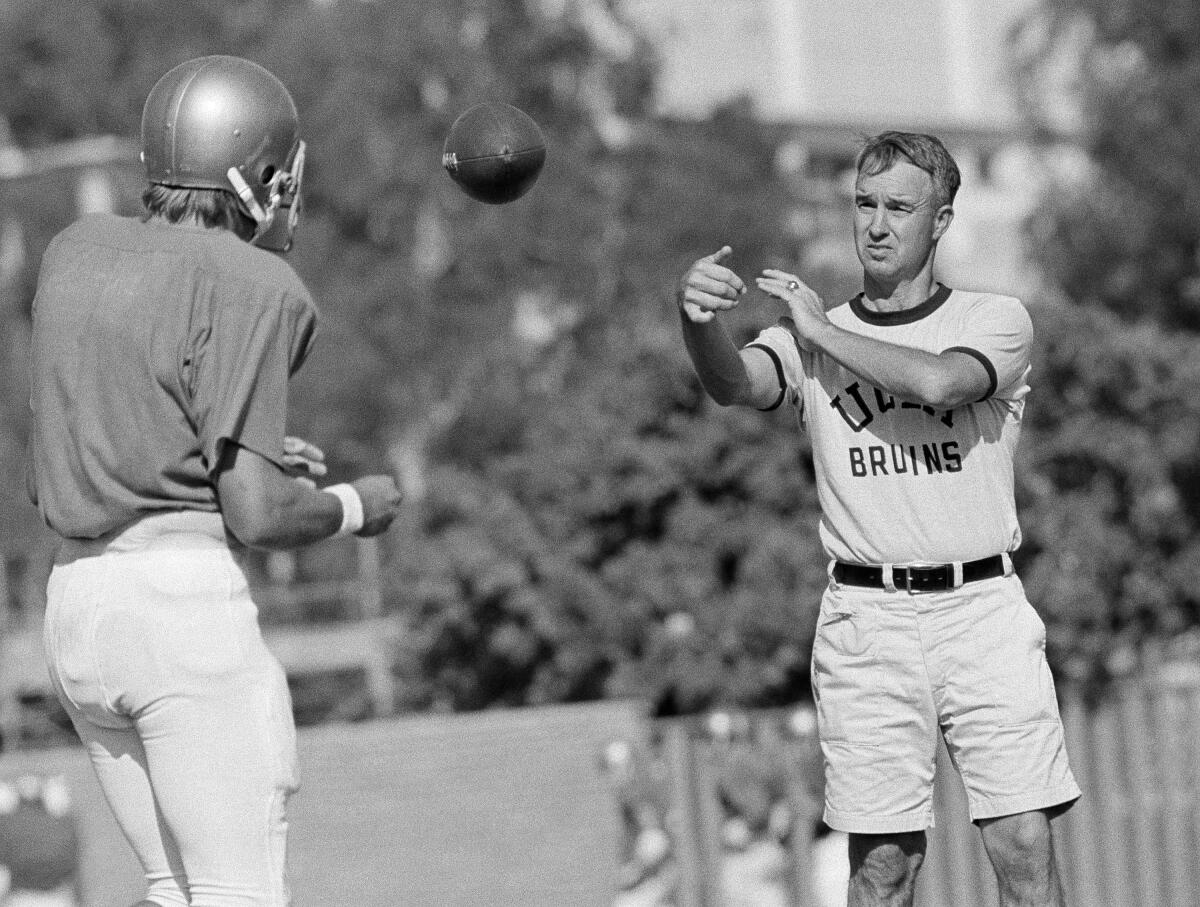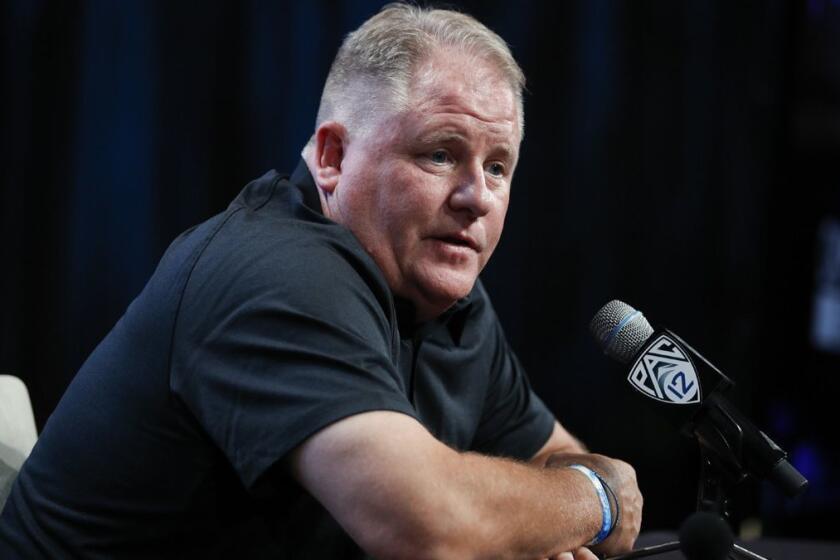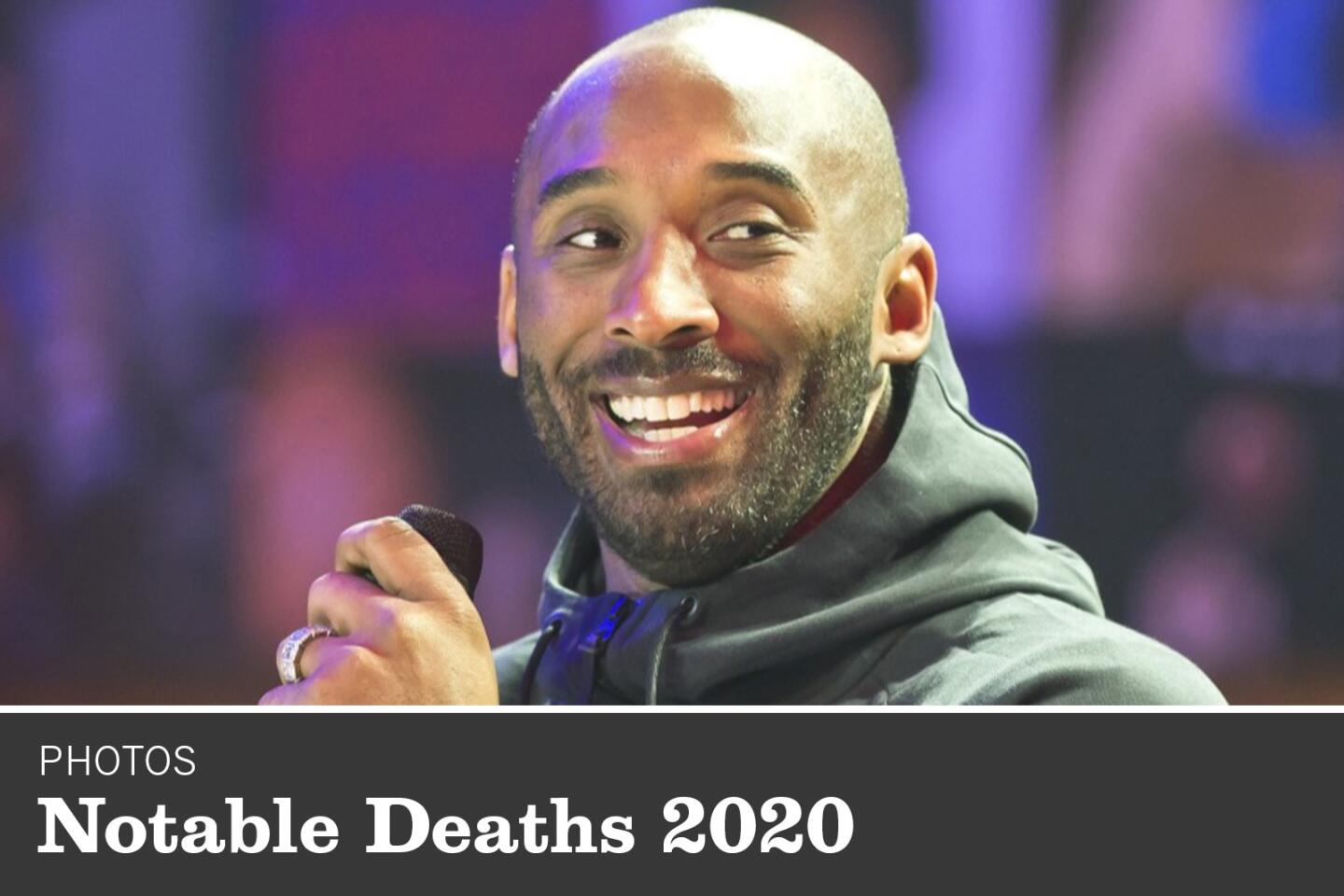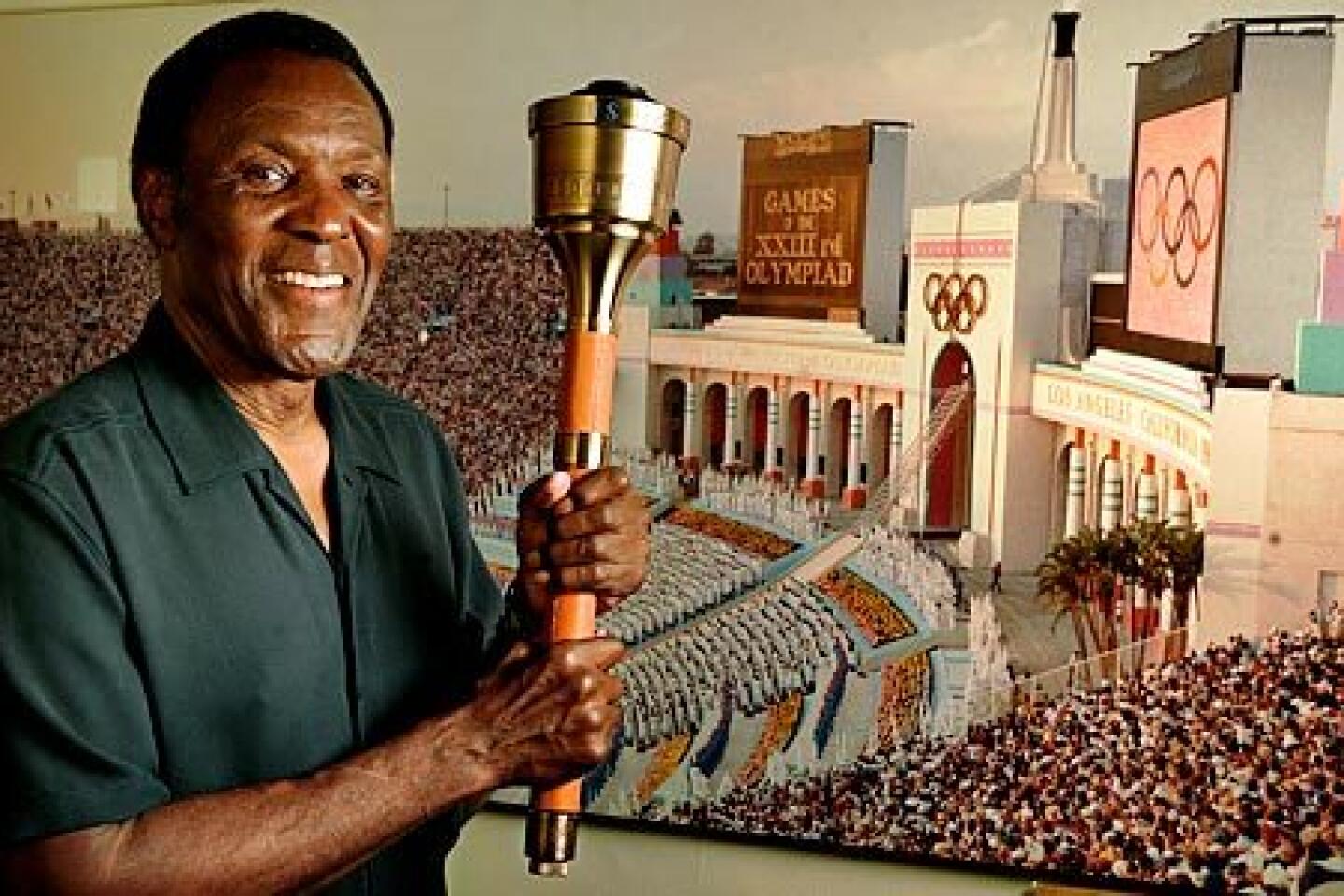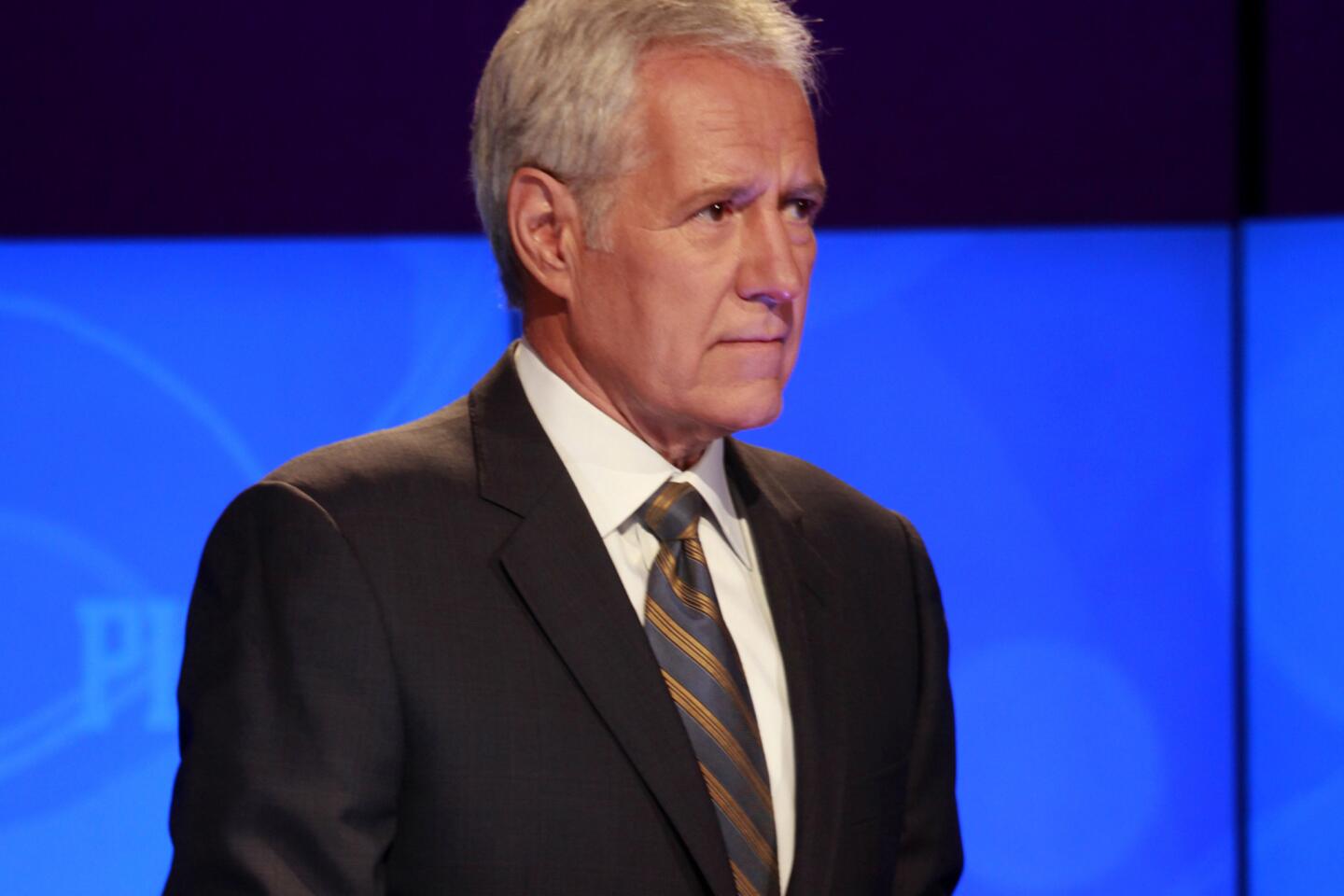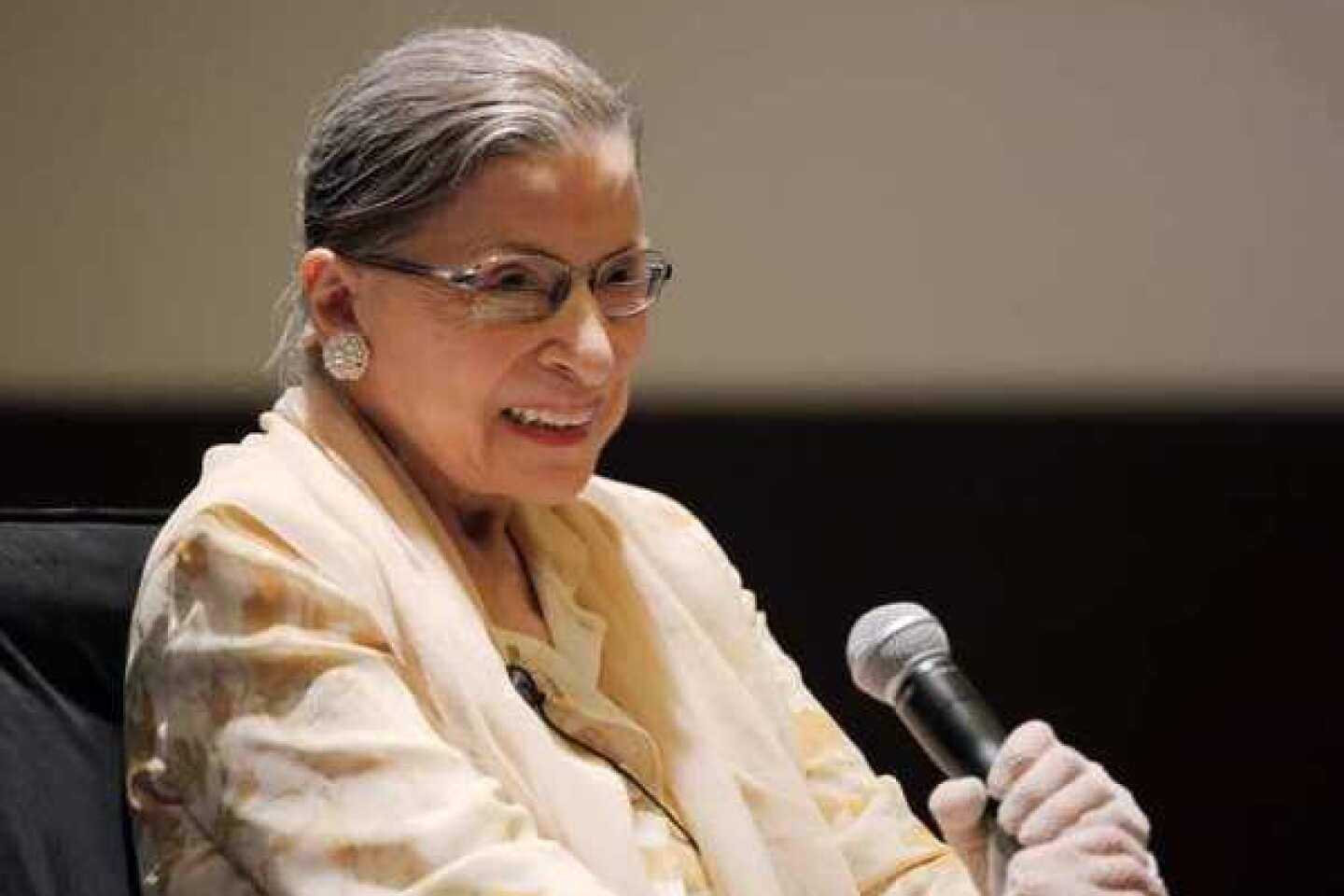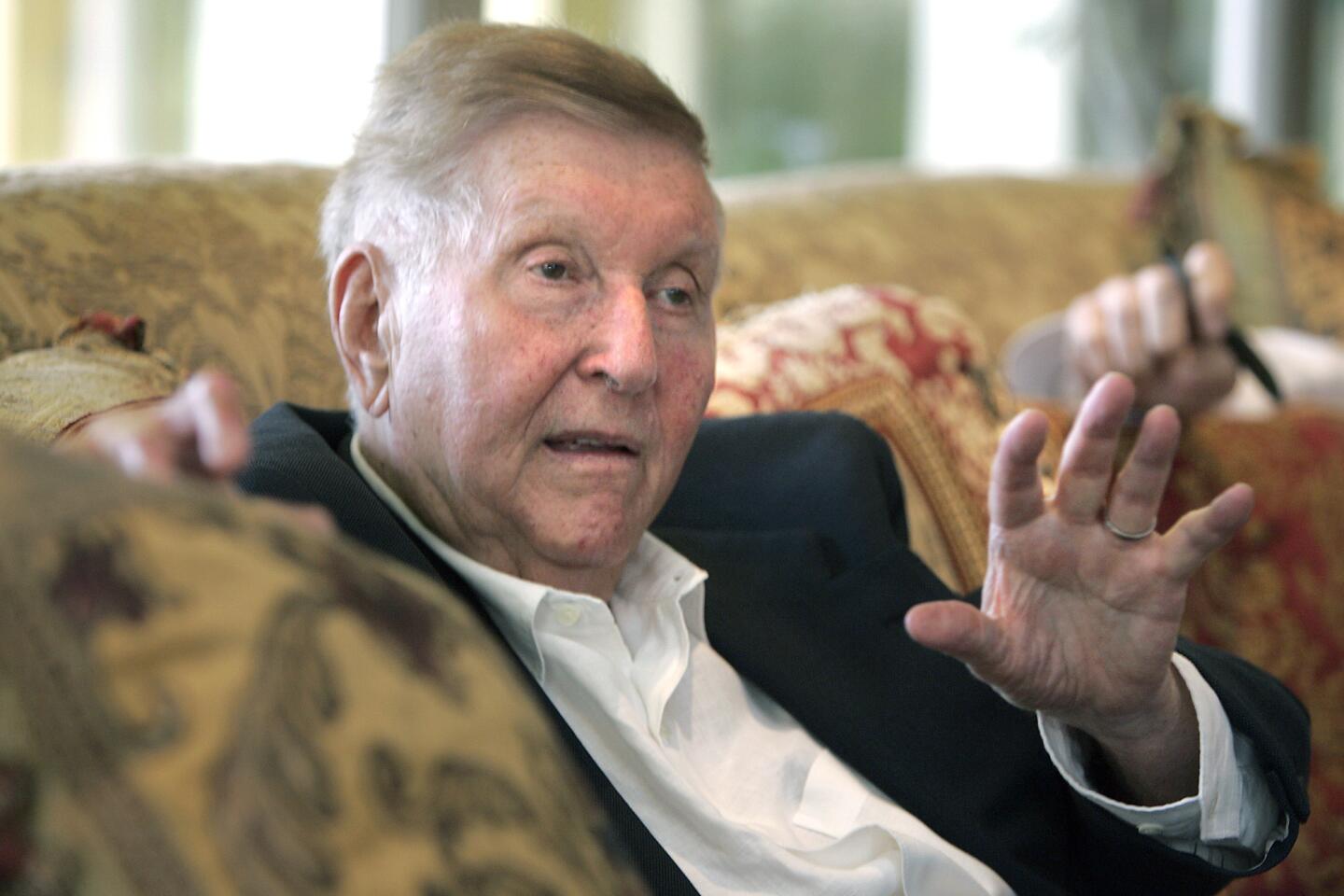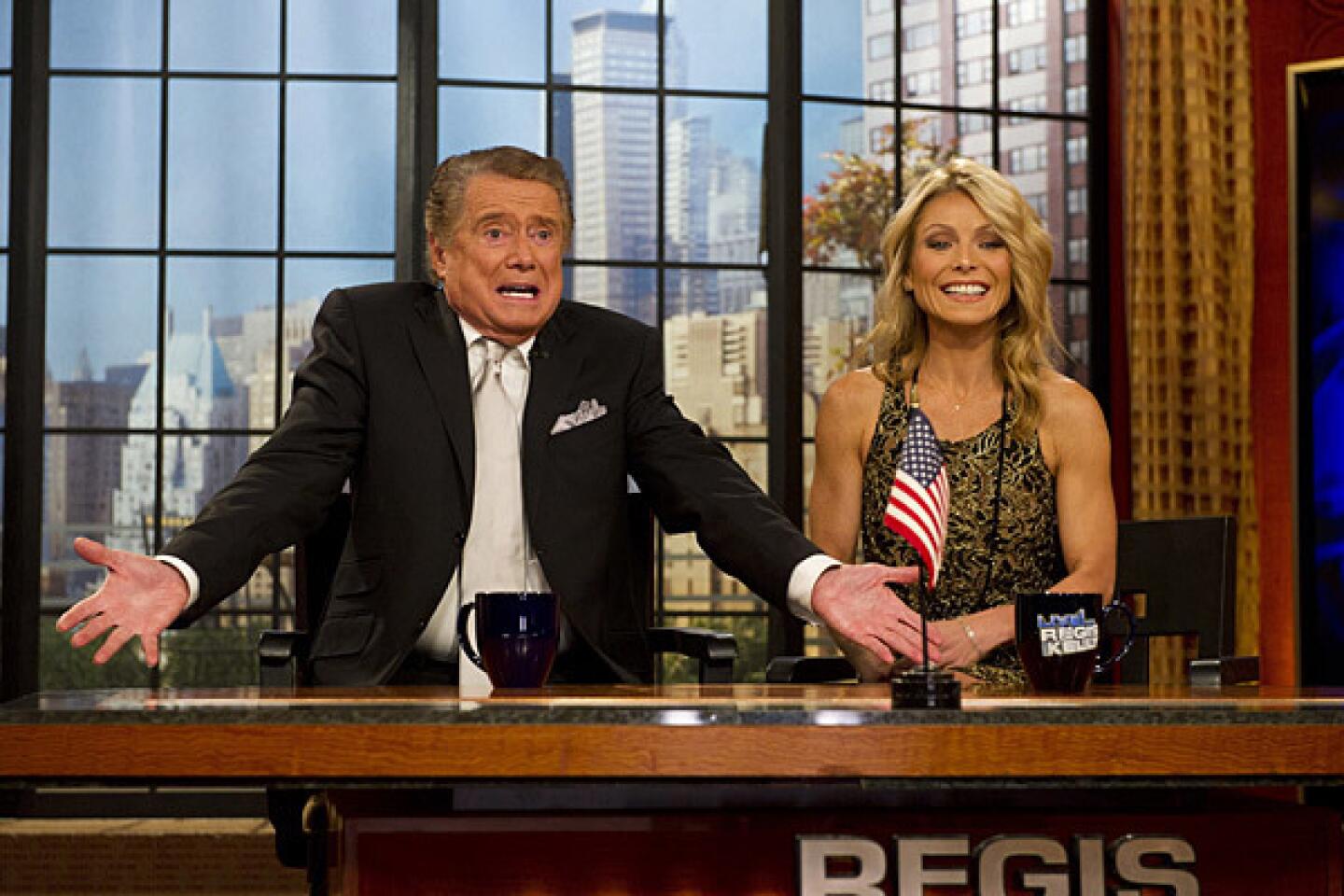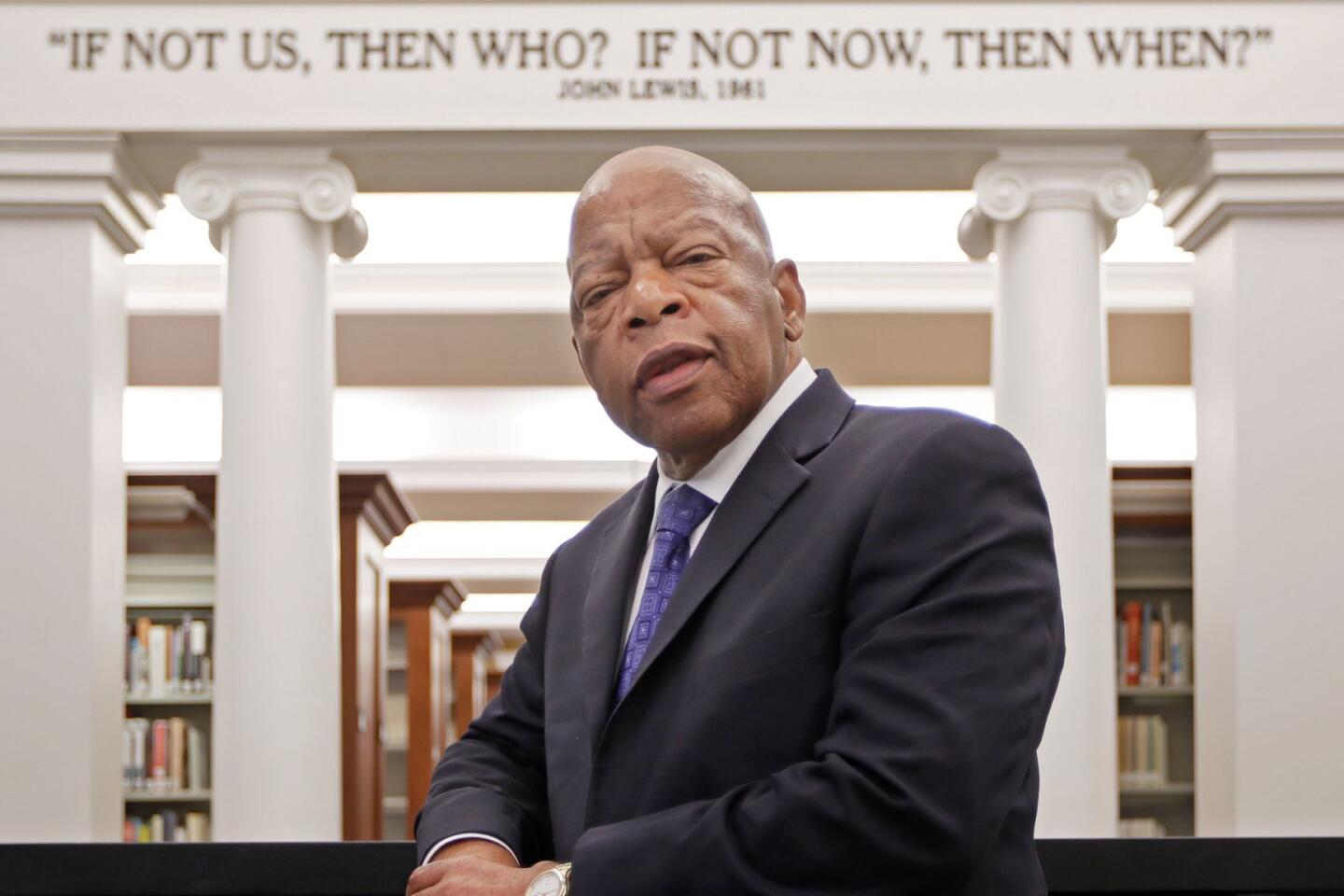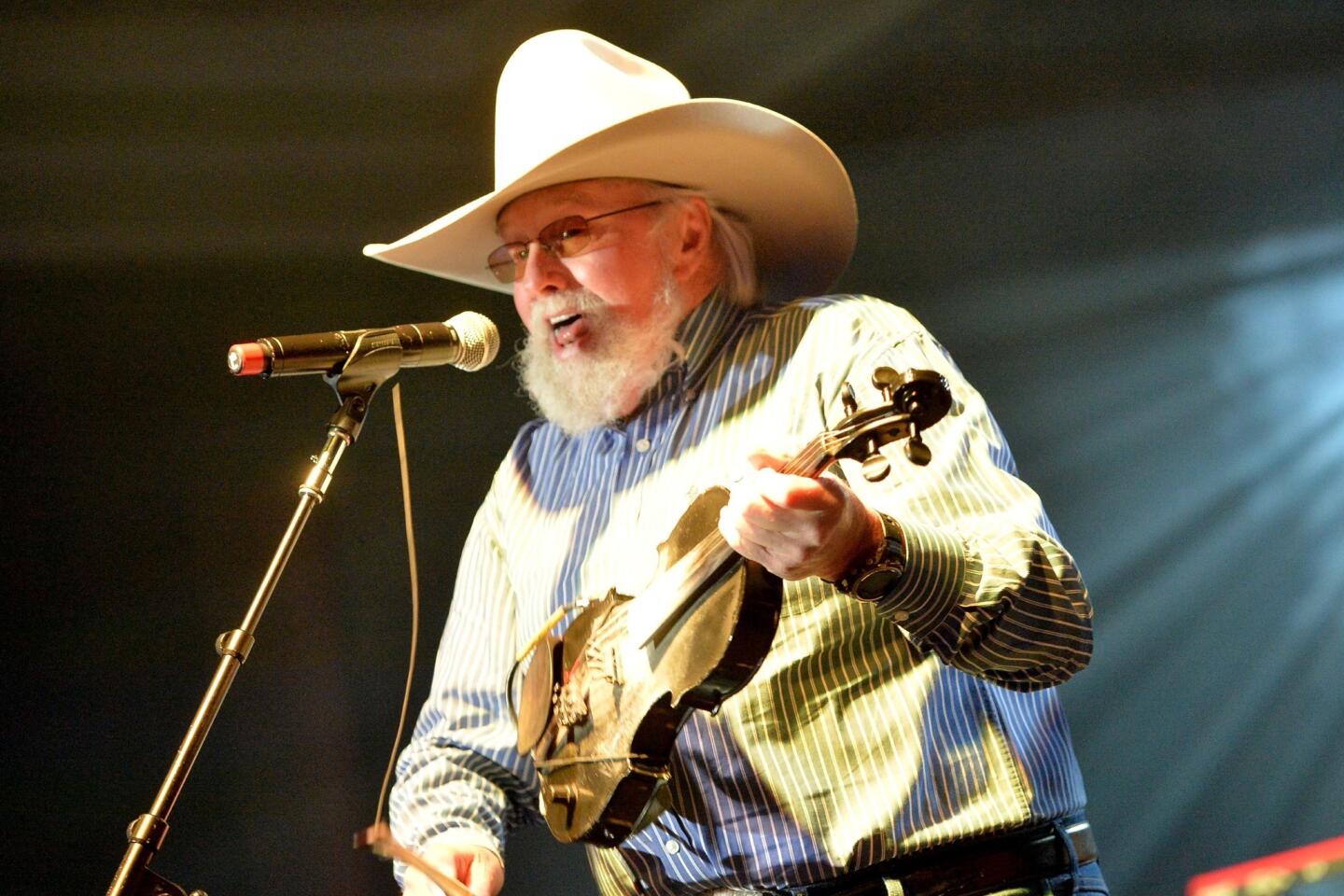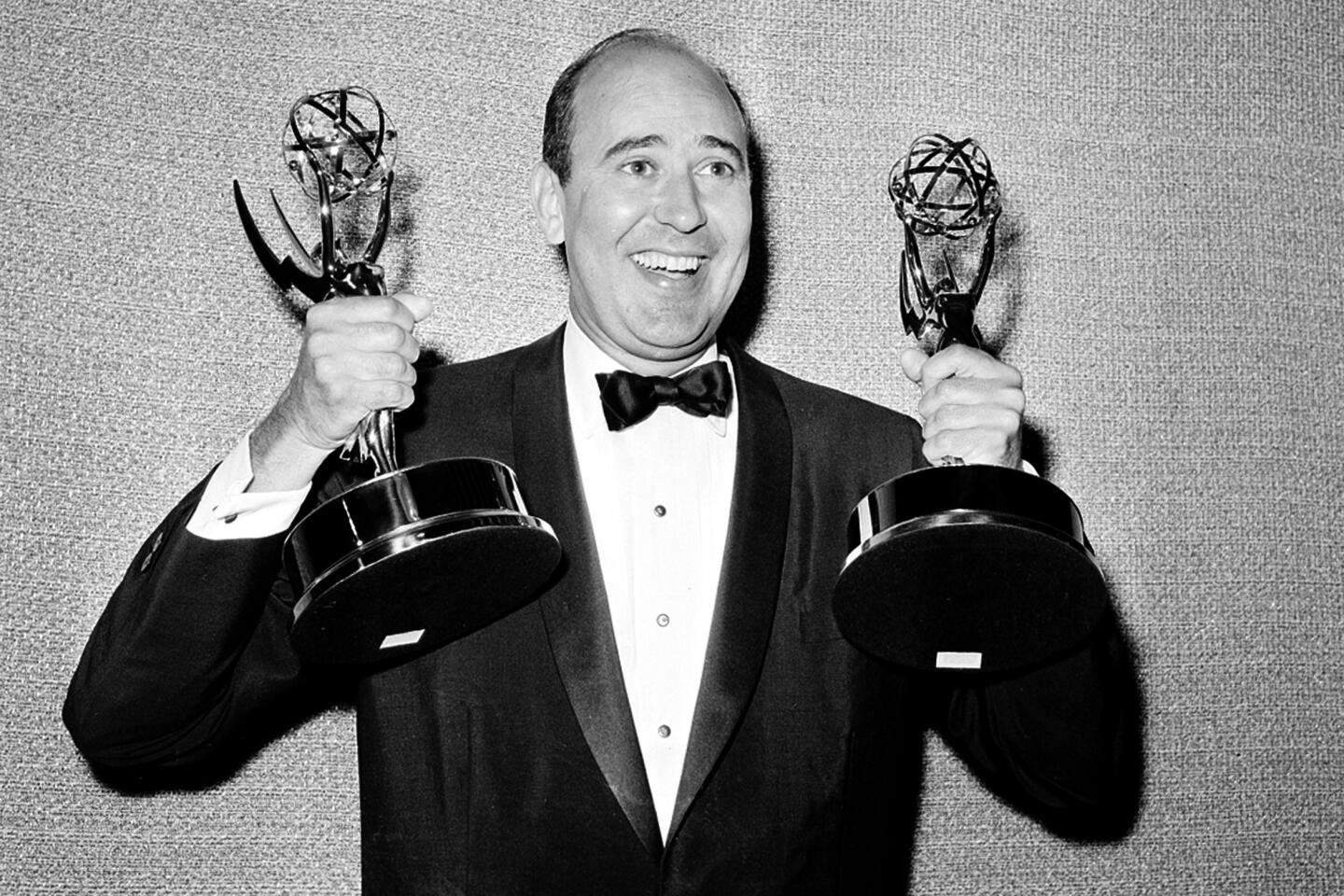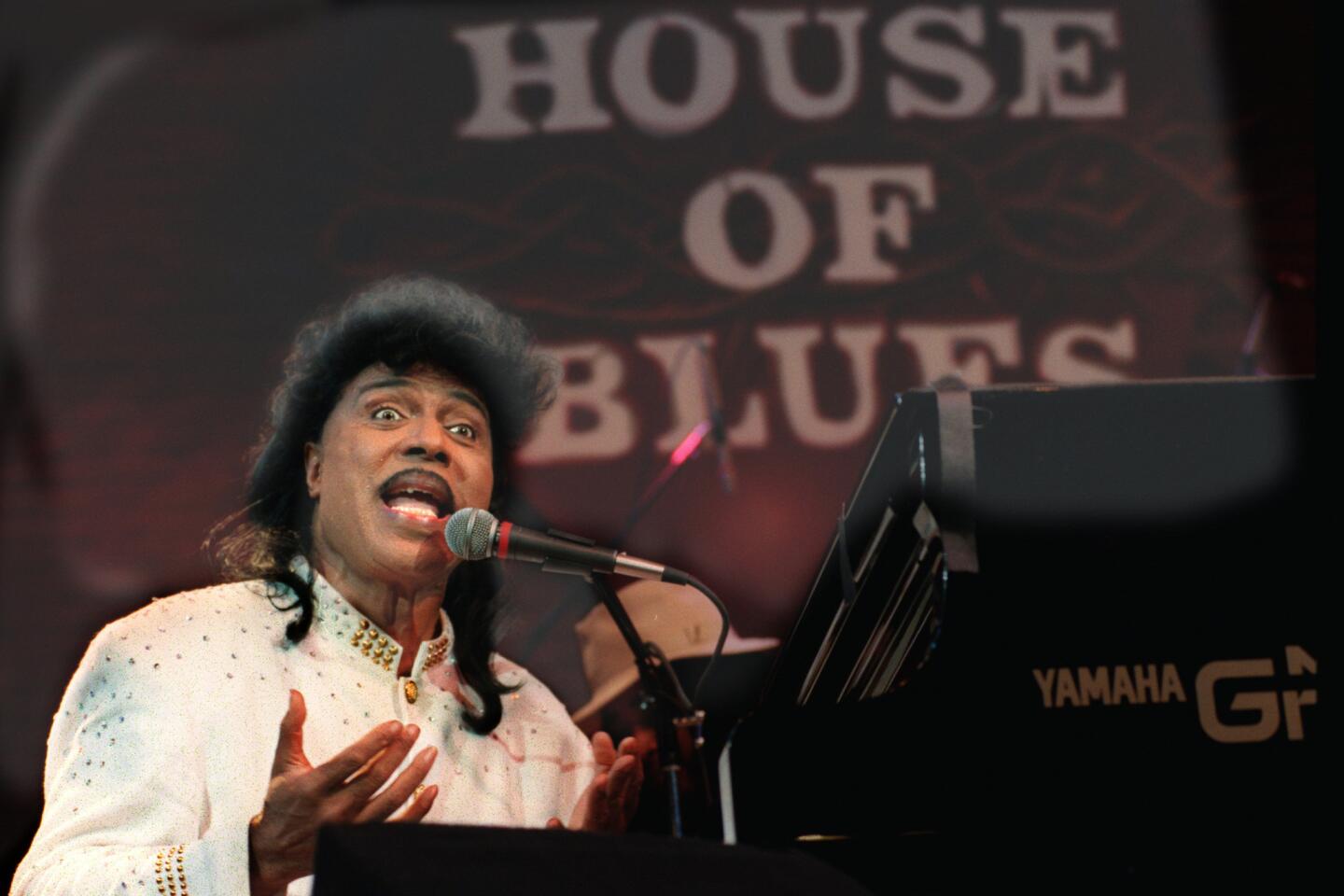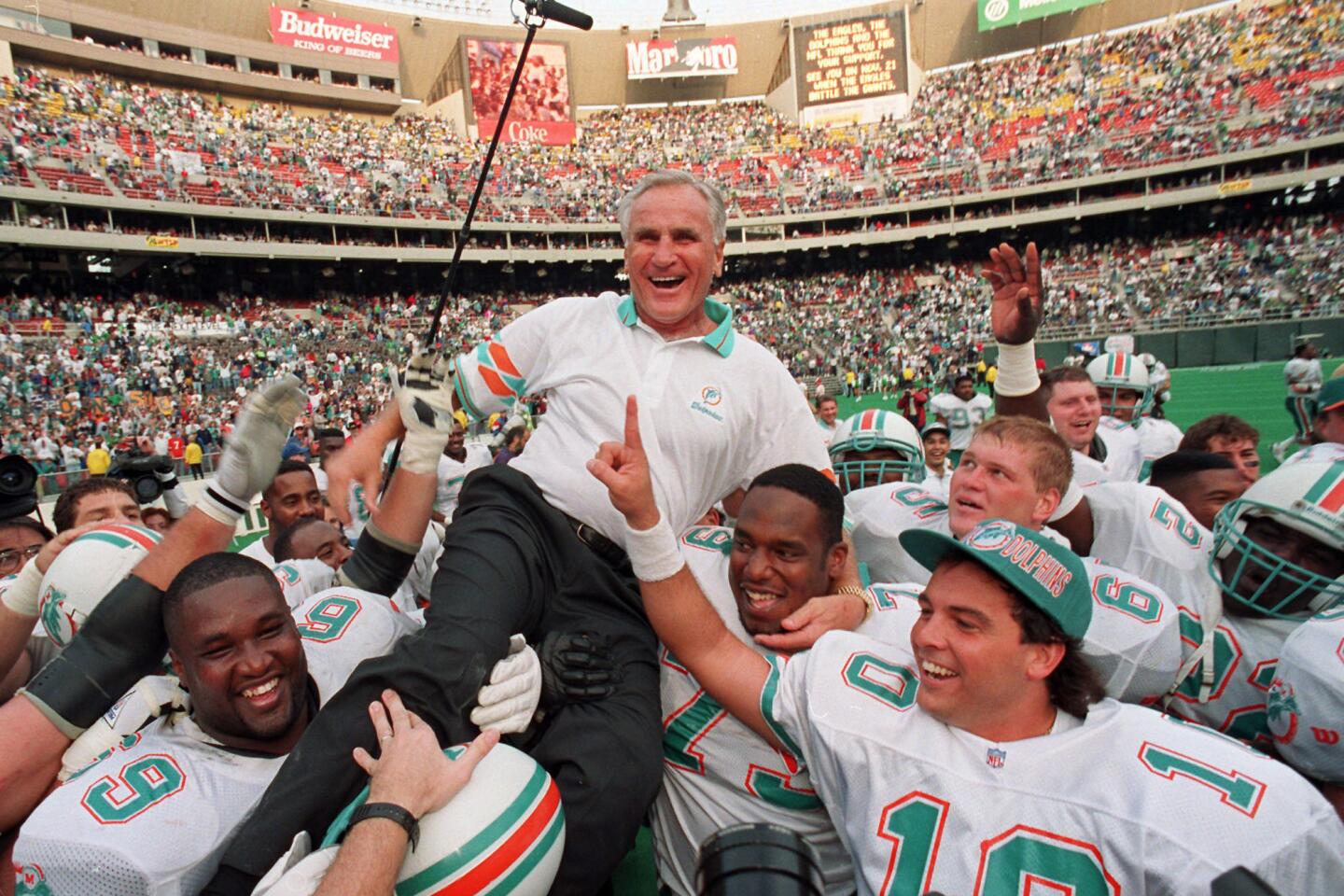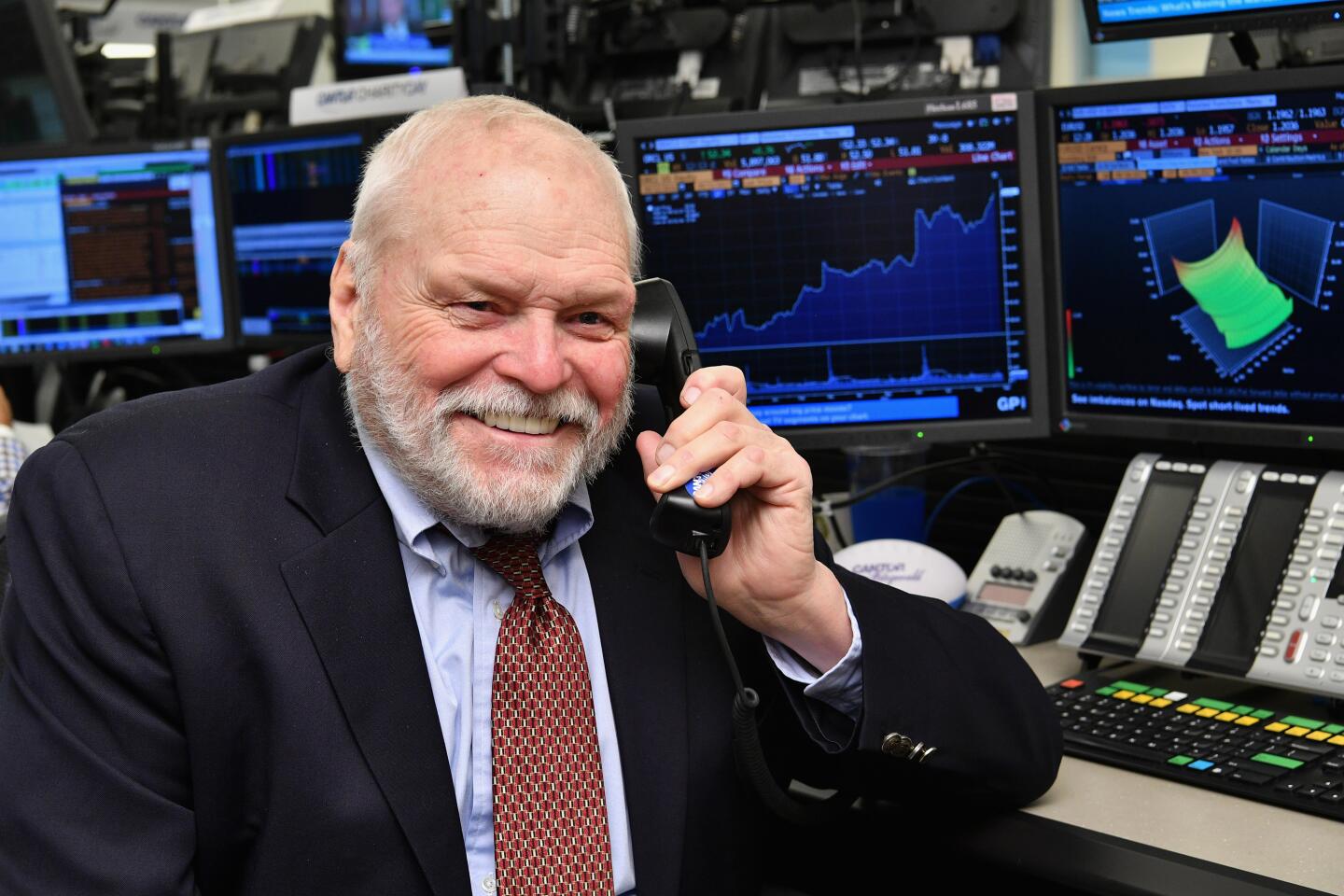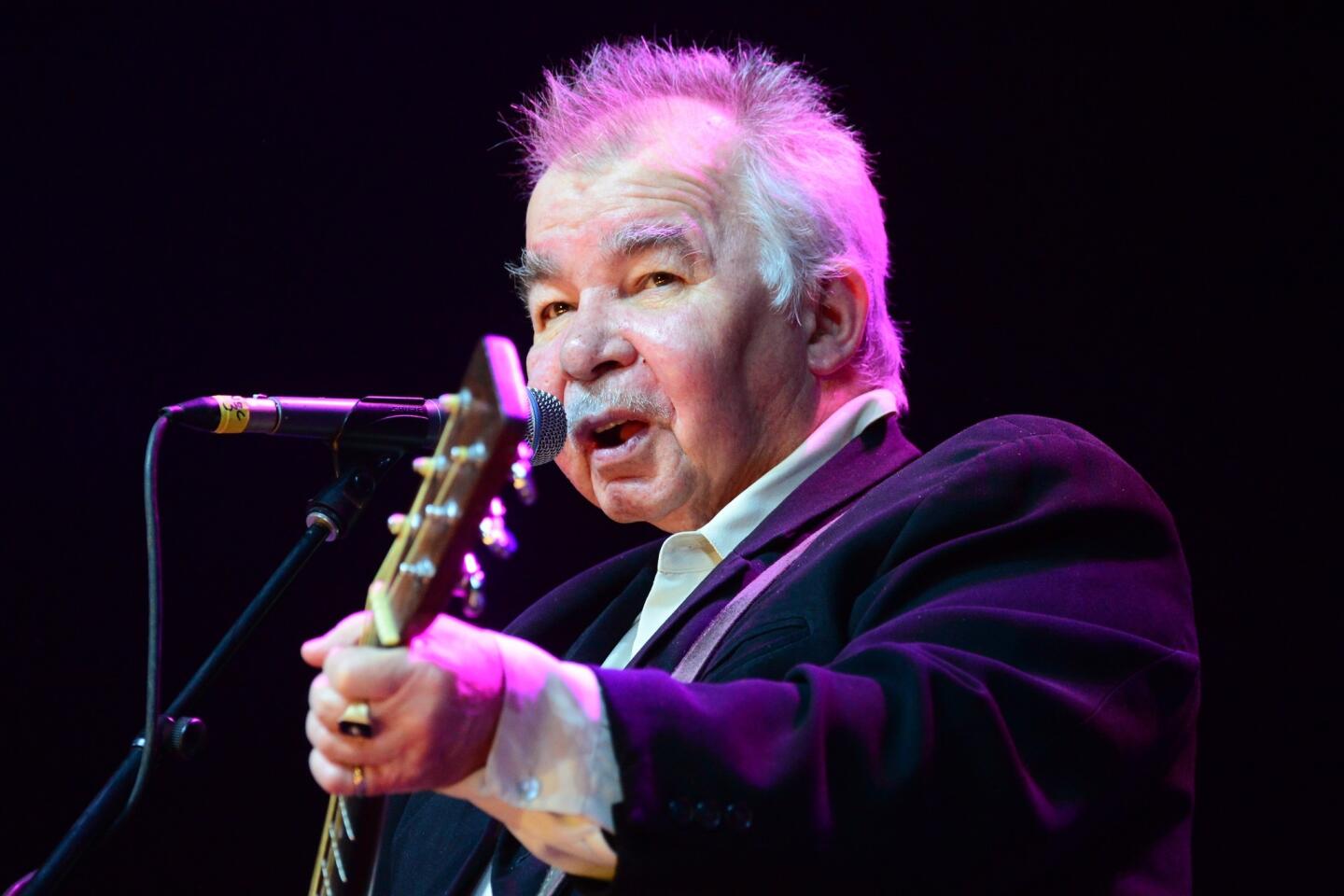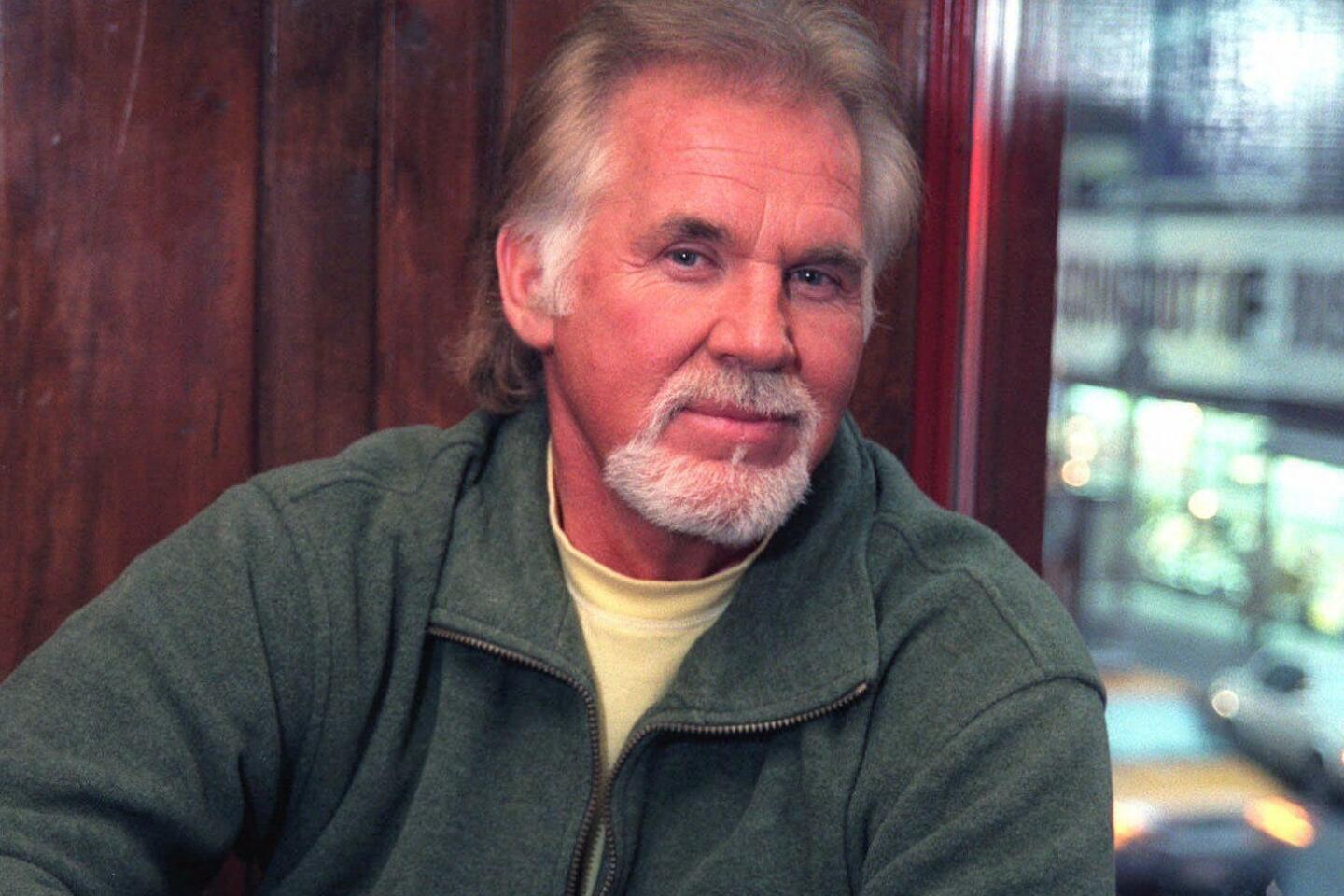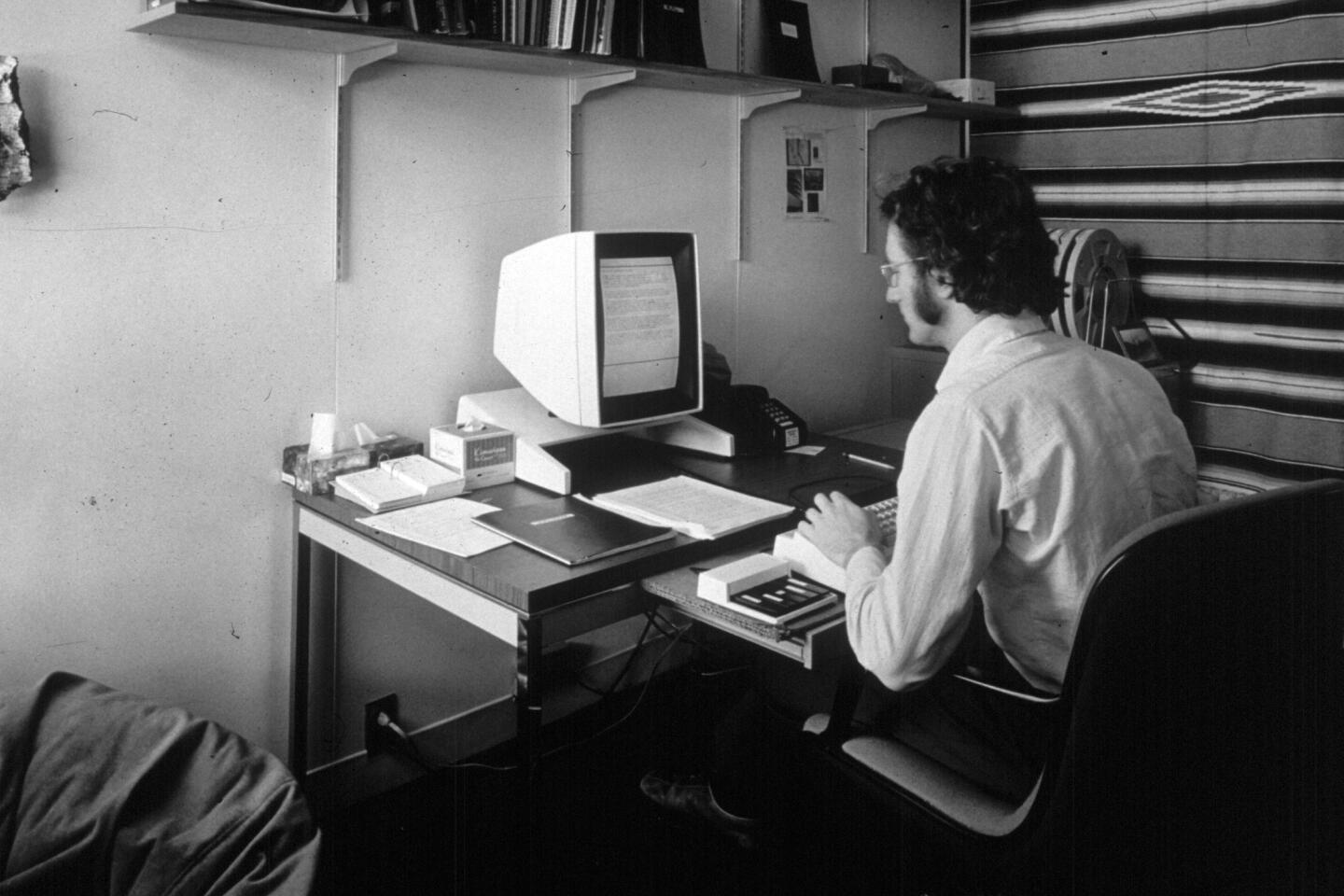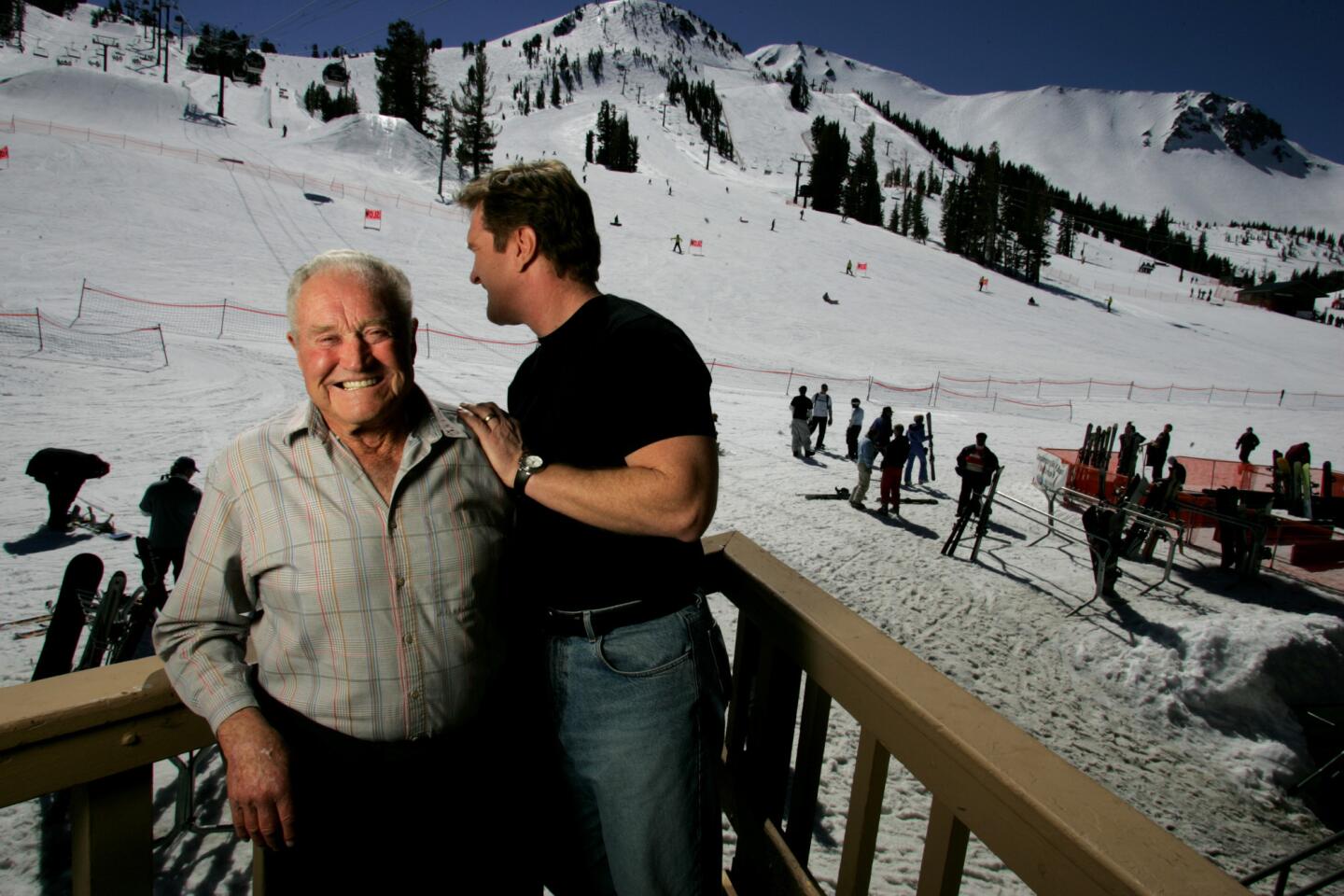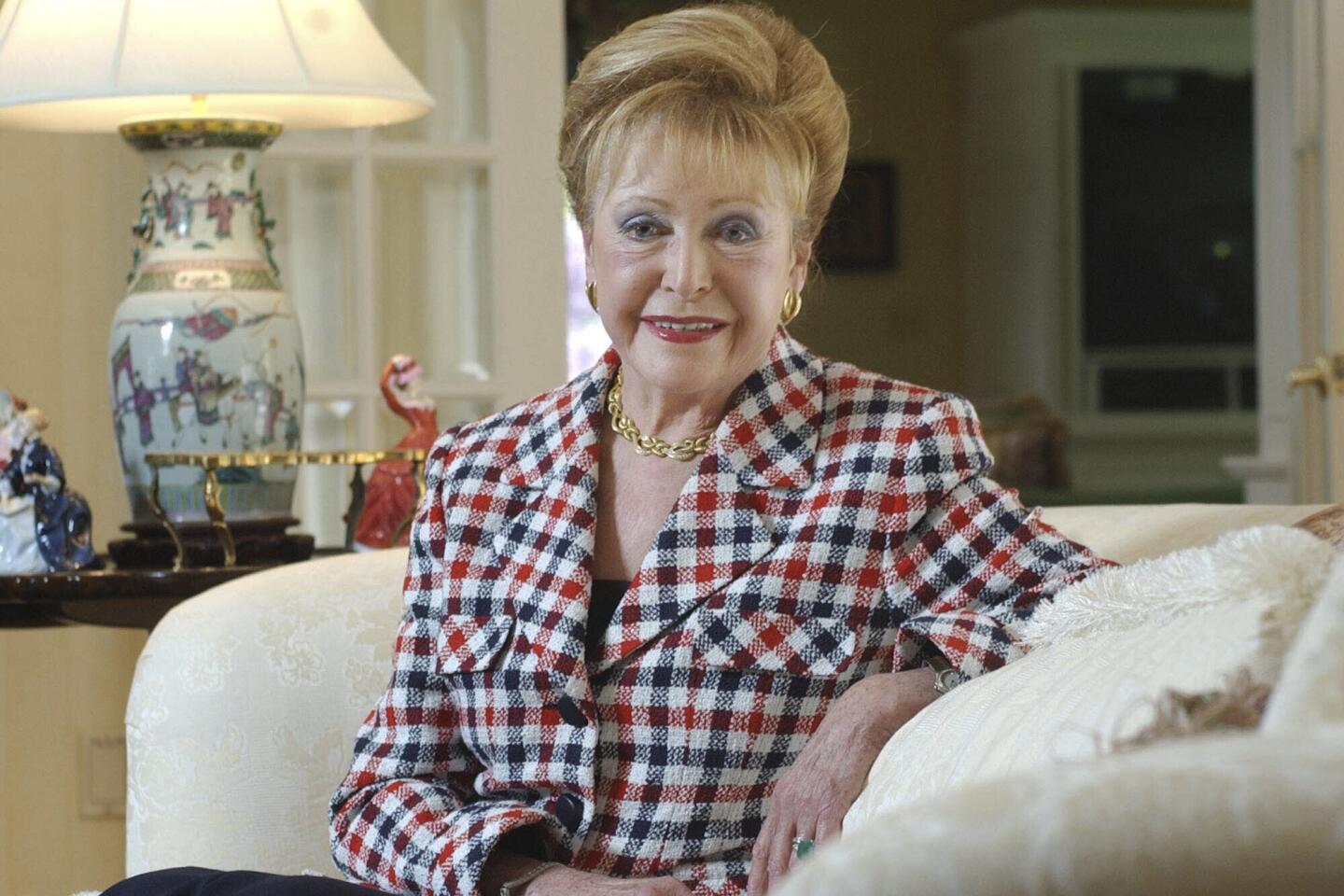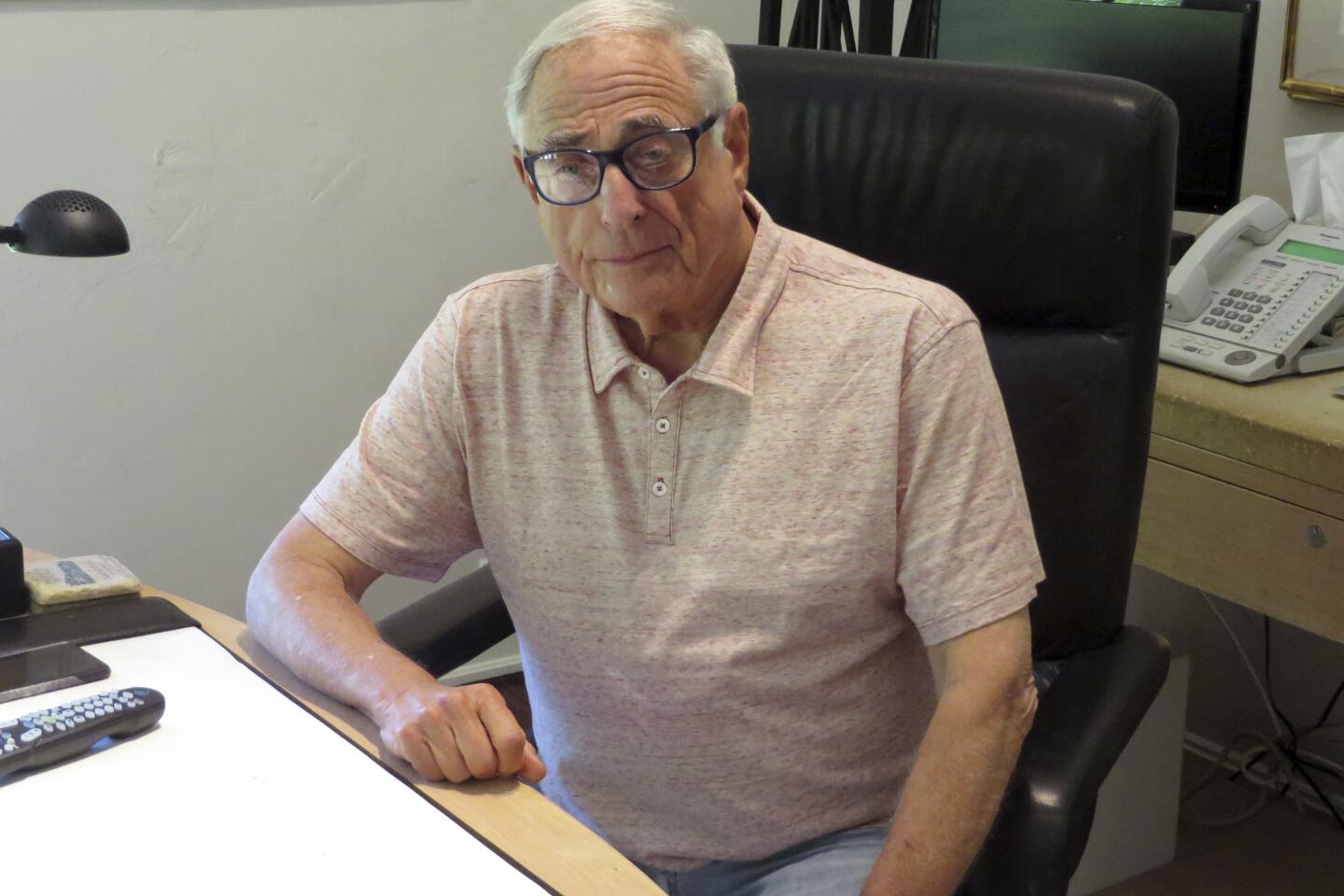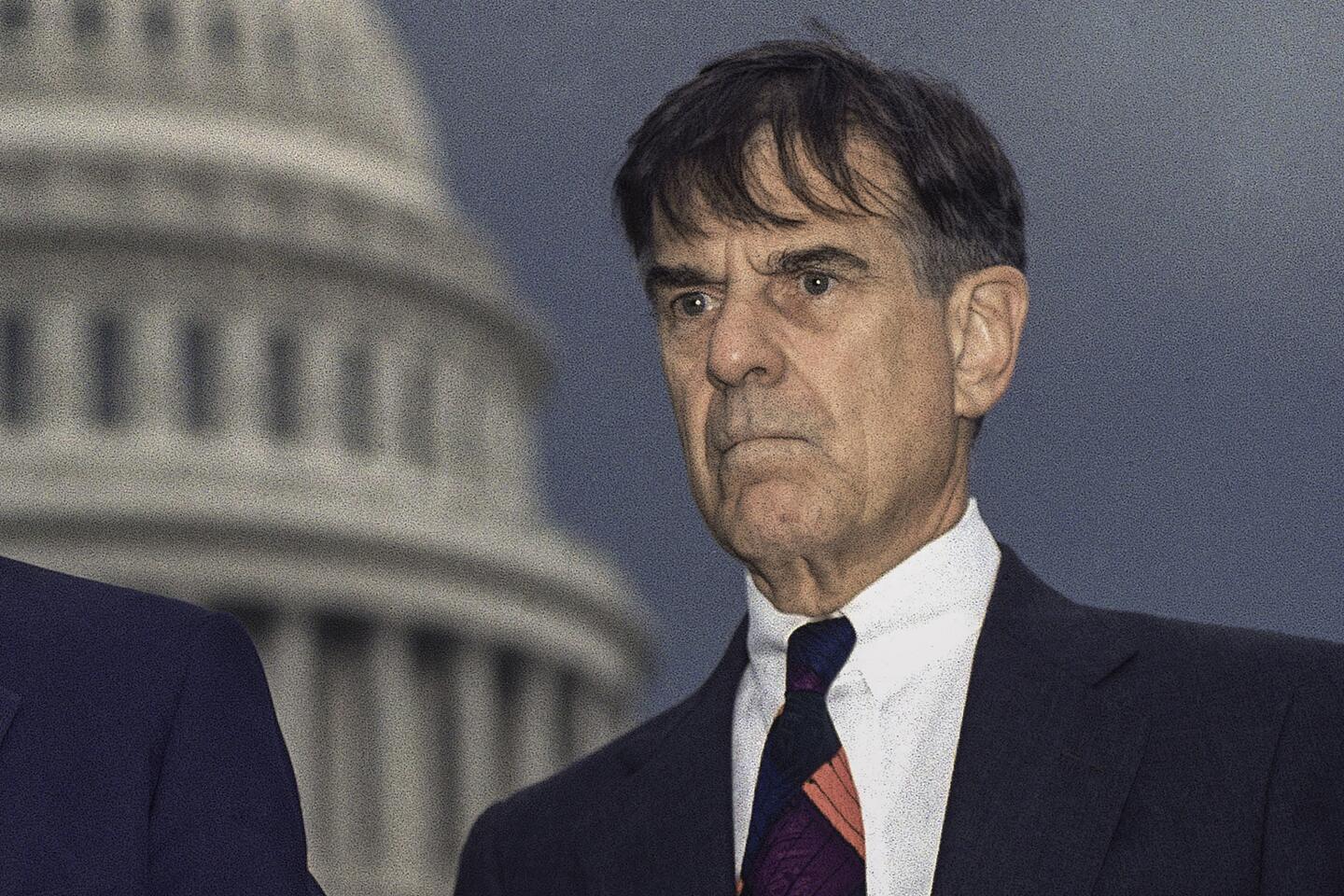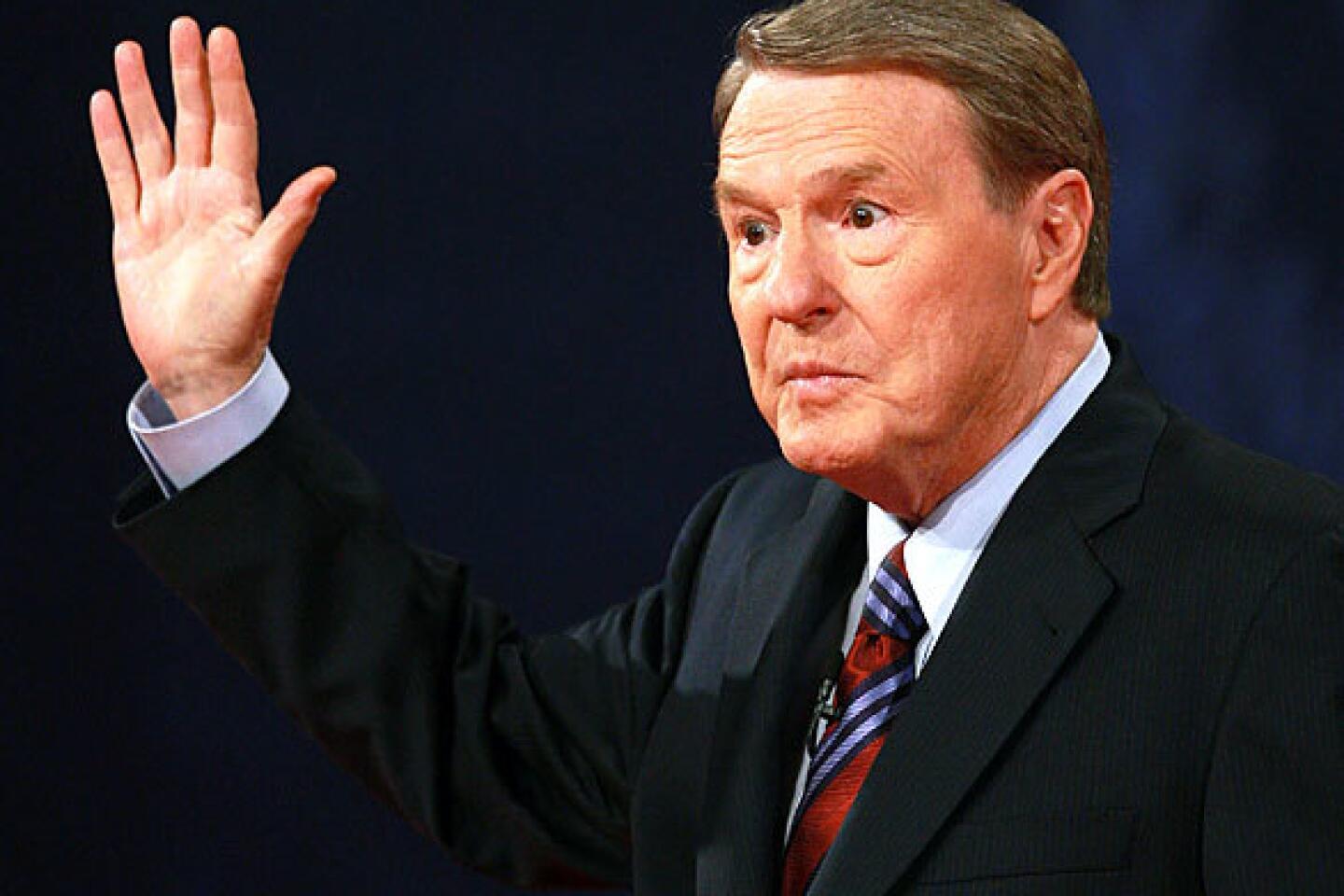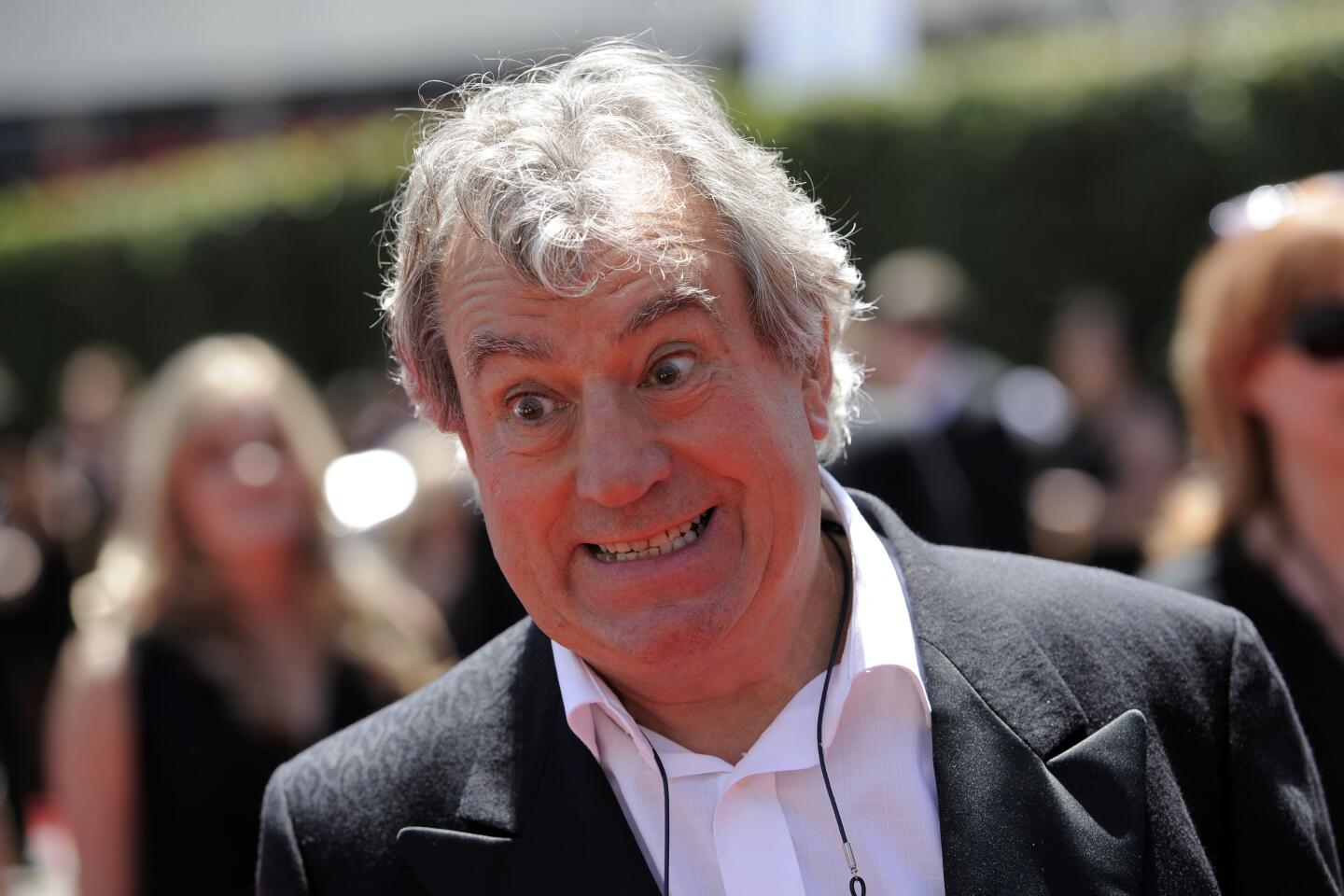Pepper Rodgers, the wisecracking former UCLA football coach who mentored some of the sport’s greatest players and coaches during a career spanning six decades, died Thursday at Reston Hospital Center in Reston, Va. He was 88.
Rodgers was taken off life support after suffering complications from a fall in his bathroom Saturday morning. He sustained arterial bleeding that preceded a stroke and a heart attack, according to his son, Rick Rodgers.
“The doctors told us this would be a serious thing for a 19-year-old, much less an 88-year-old,” Rick Rodgers said. “He had movements and he stabilized, but he never responded to sight or sound.”
Only Pepper Rodgers’ wife, Livingston, and daughter Terri were allowed to be with him in his final hours because of visiting restrictions at the hospital related to the COVID-19 pandemic. Other family members joined the group via FaceTime and Rick Rodgers relayed a message from Gary Beban, UCLA’s Heisman Trophy-winning quarterback.
“I said, ‘Dad, even your favorite quarterback, Gary Beban, says, Get your butt out of that bed and get home,’” Rick Rodgers said with a chuckle, “and I thought he blinked a little bit.”
Beban was among a long list of star players that Rodgers coached that also included Heisman winner Steve Spurrier, defensive end Reggie White and running back John Riggins. Rodgers compiled a 73-65-3 record in coaching stints at Kansas, UCLA and Georgia Tech and mentored several coaches who went on to Hall of Fame careers, including UCLA’s Terry Donahue, Ohio State’s John Cooper and Arizona’s Dick Tomey.
Rodgers liked to joke about the swift turnaround he enjoyed in his three seasons as the head coach at UCLA, going from 2-7-1 in 1971 to 8-3 in 1972 and 9-2 in 1973.
“I proved everything a man can prove in coaching,” Rodgers quipped during an interview with The Times in 2018. “I proved I could win with good players, I proved I couldn’t with bad ones.”
The best Bruins to play for Rodgers in his second stint at UCLA included quarterbacks Mark Harmon and John Sciarra and running backs James McAlister and Kermit Johnson. Harmon’s strong play and an innovative scheme devised by new offensive coordinator Homer Smith helped the Bruins engineer an upset of top-ranked, two-time defending champion Nebraska in the 1972 season opener, heralding the team’s return to prominence.
Rodgers had previously been UCLA’s offensive coordinator, and Beban liked to tease Rodgers that he had taken Beban’s national championship ring with him to Kansas when he left the Bruins after the 1966 season.
“If coach Rodgers had not left for the head coaching opportunity at Kansas my senior year in 1967,” Beban said via email, “we would not have lost to USC by one point, and in essence, the national championship. Coach Rodgers was worth at least another six points when he was calling the plays from the coaches’ press box.”
Not every Bruin lamented the move. Rodgers gave Donahue, a former UCLA defensive lineman fresh out of the Air Force, his first coaching job after Donahue called him and told him he wanted to join the profession.
“I said, ‘Well, Terry, I don’t have a job for a 23-year-old guy who’s never coached.’” Rodgers said in 2018. “He said, ‘I’ll work for nothing. Give me something to do.’”
Donahue spent a year as a volunteer assistant, the start of a career in which he went on to spend 20 years as UCLA’s head coach and become the winningest coach in Pac-12 history with 98 conference victories. He may not have gotten there had Rodgers not forgiven him for watching Kansas star Karl Salb quit the team in a huff without trying to stop him.
“[Rodgers] leaned forward in his desk and he said, ‘Terry, do you know how hard it is to recruit a 275-pound athlete who can run 4.8 in the 40-yard dash and play as athletically as this guy?’” Donahue remembered Rodgers asking him before he acknowledged to his boss that he did not. “‘And do you know how easy it is to find a 31-year-old defensive line coach? You get out of this office and you get Salb back on this team’ and I did, and I kept my job.”
Born in Atlanta on Oct. 8, 1931, Rodgers played at Georgia Tech under legendary coach Bobby Dodd and was a backup quarterback and kicker on the Yellow Jackets’ 1952 national championship team. He started his coaching career as an assistant at Air Force in 1958 and went to Florida two years later before arriving at UCLA in 1965 for his first stint at the school.
He left the Bruins for good after the 1973 season, lured by his alma mater.
“I sold peanuts and cola to Tech players when I was 10 years old,” Rodgers said, “so it was a lifelong dream for me.”
After six seasons with the Yellow Jackets, Rodgers returned to coaching in 1984 for a two-year stint with the Memphis Showboats of the United States Football League and concluded his coaching career with the Canadian Football League’s Memphis Mad Dogs in 1995. He went 34-31-2 at Georgia Tech and 27-27 record in his three professional seasons.
“If football came down to personality,” I.J. Rosenberg once wrote in the Atlanta Journal-Constitution, “Franklin ‘Pepper’ Rodgers never would have lost a game.”
Rodgers was vice president of football operations for the Washington Redskins from 2001 until his retirement in 2004.
Rodgers is survived by his wife, Livingston Rodgers, sons Rick and Kyle and daughters Terri and Kelly, six grandchildren and one great-grandchild.
1/25
Kobe Bryant, Ruth Bader Ginsburg, Sean Connery and more. (Los Angeles Times)
2/25
Rafer Johnson, winner of the 1960 Olympic decathlon gold medal, was a man whose legacy was interwoven with Los Angeles history, beginning with his performances as a world-class athlete at UCLA and punctuated by the night in 1968 when he helped disarm Robert F. Kennedy’s assassin at the Ambassador Hotel. Johnson lit the Olympic flame at the opening of the 1984 Summer Games in Los Angeles. He was 86.
(Mel Melcon / Los Angeles Times) 3/25
With his quick wit and easy smile,
Alex Trebek drove the game show “Jeopardy!” up the ratings charts and became a welcome television host in America’s living rooms. As the quiz show rolled through the decades, Trebek remained a comfortable fit — in a 2014 Reader’s Digest poll, Trebek ranked as the eighth-most trusted person in the United States, right behind Bill Gates and 51 spots above Oprah Winfrey. He was 80.
(Los Angeles Times) 4/25
Guitarist Eddie Van Halen’s speed and innovations along the fretboard inspired a generation of imitators as the band bearing his name rose to MTV stardom and multiplatinum sales over 10 consecutive albums. The streak made Van Halen one of the most successful bands in rock history, including two albums that reached diamond status (10 million copies sold): 1978’s debut “Van Halen” and 1984’s “1984.” He was 65.
(Wibbitz/Getty) 5/25
Justice Ruth Bader Ginsburg championed women’s rights — first as a trailblazing civil rights attorney who methodically chipped away at discriminatory practices, then as the second woman to serve on the Supreme Court, and finally as an unlikely pop culture icon. A feminist hero dubbed Notorious RBG, Ginsburg became the leading voice of the court’s liberal wing, best known for her stinging dissents on a bench that mostly skewed right since her 1993 appointment. She was 87.
(Kiichiro Sato / Associated Press) 6/25
Chadwick Boseman’s breakout role was playing Dodger Jackie Robinson in the 2013 sports biopic “42.” The next year, he made an electrifying lead turn as James Brown, the Godfather of Soul, in “Get on Up.” Then came the role that would change his career: As
Black Panther, the Marvel Cinematic Universe’s first Black superhero, Boseman became the face of Wakanda to millions of fans around the world and helped usher in a new and inclusive era of superhero blockbusters. He was 43.
(Jay L. Clendenin / Los Angeles Times) 7/25
Sumner Redstone outmaneuvered rivals to assemble one of America’s leading entertainment companies, now called ViacomCBS, which boasts CBS, Comedy Central, MTV, Nickelodeon, BET, Showtime, the Simon & Schuster book publisher and Paramount Pictures movie studio. Unlike contemporaries Rupert Murdoch and Ted Turner, Redstone was not a visionary, but rather a hard-charging lawyer and deal maker who pursued power and wealth through the accumulation of content companies. He was 97.
(Brian Vander Brug / Los Angeles Times) 8/25
Regis Philbin reigned for decades as the comfortable and sometimes cantankerous morning host of “Live,” first with Kathie Lee Gifford and later Kelly Ripa, above. He earned Emmy nominations by the armful, hosted New Year’s Eve specials, rode in parades, set a record for the most face-time hours on television and helped reinvigorate prime-time game shows with “Who Wants to Be a Millionaire.” He was 88.
(Charles Sykes / Associated Press) 9/25
Rep. John Lewis famously shed his blood at the foot of a Selma, Ala., bridge in a 1965 demonstration for Black voting rights, and went on to become a 17-term Democratic member of Congress. An inspirational figure for decades, Lewis was one of the last survivors among members of the Rev. Martin Luther King Jr.’s inner circle. He was 80.
(Mark Humphrey / Associated Press) 10/25
Country music firebrand and fiddler Charlie Daniels started out as a session musician, which included playing on Bob Dylan’s 1969 album “Nashville Skyline,” and beginning in the early 1970s toured endlessly with his own band, sometimes doing 250 shows a year. In 1979, Daniels had a crossover smash with “The Devil Went Down to Georgia,” which topped the country chart, hit No. 3 on the pop chart and was voted single of the year by the Country Music Assn. He was 83.
(Rick Diamond / Getty Images for IEBA) 11/25
Carl Reiner first came to national attention in the 1950s on Sid Caesar’s “Your Show of Shows,” where he wrote alongside Mel Brooks, Neil Simon and other comedy legends. He later created “The Dick Van Dyke Show,” one of TV’s most fondly remembered sitcoms, and directed hit films including “The Comic” (1969), starring Van Dyke; “Where’s Poppa?” (1970), starring George Segal and Ruth Gordon; “Oh, God!” starring George Burns and John Denver; and four films starring Steve Martin. He was 98.
(Associated Press ) 12/25
The flamboyant, piano-pounding Little Richard roared into the rock ‘n’ roll spotlight in the 1950s with hits such as “Tutti-Frutti,” “Long Tall Sally” and “Good Golly, Miss Molly.” The Georgia native’s raucous sound fused gospel
fervor and R&B sexuality, profoundly influencing the Beatles, James Brown (who succeeded him in one of his early bands), Jimi Hendrix (one of his backup musicians in the mid-’60s) and Bruce Springsteen. He was 87.
(Boris Yaro / Los Angeles Times) 13/25
Don Shula was the NFL’s winningest coach, leading the 1972 Miami Dolphins to the league’s only undefeated season. He coached the Baltimore Colts to one Super Bowl and the Dolphins to five, winning Lombardi Trophies after the 1972 and ’73 seasons. He was 90.
(ASSOCIATED PRESS) 14/25
Former Egyptian
President Hosni Mubarak crushed dissent for decades until the 2011 Arab Spring movement drove him from power. During his presidency, which spanned nearly 30 years, he protected Egypt’s stability as intifadas roiled Israel and the Palestinian territories, the U.S. led two wars against Iraq, Iran fomented militant Shiite Islam across the region and global terrorism complicated the divide between East and West. He was 91.
(Sameh Sherif / AFP/Getty Images) 15/25
Among his 40-odd films,
burly Brian Dennehy played a sheriff who jailed Rambo in “First Blood,” a serial killer in “To Catch a Killer” and a corrupt sheriff in “Silverado.” On Broadway, he was awarded Tonys for his roles in “Death of a Salesman” (1999) and “Long Day’s Journey Into Night” (2003). He was 81.
(Dia Dipasupil) 16/25
Singer-songwriter John Prine broke onto the folk scene in 1971 with a self-titled album that included two songs brought to broader audiences by Bette Midler and Bonnie Raitt: “Hello in There” and “Angel From Montgomery,” respectively. In 2019, he was elected to the Songwriters Hall of Fame. He was 73.
(Frazer Harrison / Getty Images for Stagecoach) 17/25
Country singer Kenny Rogers racked up an impressive string of hits — initially as a member of The First Edition starting in the late 1960s and later as a solo artist and duet partner with Dolly Parton — and earned three Grammy Awards, 19 nominations and a slew of accolades from country-music awards shows. Country purists balked at his syrupy ballads, but his fans packed arenas that only the titans of rock could fill. He was 81.
(Suzanne Mapes / Associated Press) 18/25
Xerox researcher Larry Tesler pioneered concepts that made computers more user-friendly, including moving text through cut, copy and paste. In 1980, he joined Apple, where he worked on the Lisa computer, the Newton personal digital assistant and the Macintosh. He was 74.
(AP) 19/25
Ski industry pioneer Dave McCoy transformed a remote Sierra peak into the storied Mammoth Mountain Ski Area. Over six decades, it grew from a downhill depot for friends to a profitable operation of 3,000 workers and 4,000 acres of ski trails and lifts, a mecca for generations of skiers and boarders. He was 104. (Genaro Molina / Los Angeles Times)
20/25
Screen icon
Kirk Douglas brought a clenched-jawed intensity to an array of heroes and heels, receiving Oscar nominations for his performances as an opportunistic movie mogul in the 1952 drama “The Bad and the Beautiful” and as Vincent van Gogh in the 1956 drama “Lust for Life.” As executive producer of “Spartacus,” Douglas helped end the Hollywood blacklist by giving writer Dalton Trumbo screen credit under his own name. He was 103.
(Annie Wells / Los Angeles Times) 21/25
“Queen of Suspense”
Mary Higgins Clark became a perennial best-seller, writing or co-writing “A Stranger Is Watching,” “Daddy’s Little Girl” and more than 50 other favorites. Her sales topped 100 million copies, and many of her books, including “A Stranger is Watching” and “Lucky Day,” were adapted for movies and television. She was 92.
(Associated Press) 22/25
Fred Silverman was the head of programming at CBS, where he championed a string of hits including “The Mary Tyler Moore Show,” “All in the Family,” “MASH” and “The Jeffersons.” Later at ABC, he programmed “Laverne & Shirley,” “The Love Boat,” “Happy Days” and the 12-hour epic saga “Roots.” He was 82.
(Associated Press) 23/25
Former California
Rep. Fortney “Pete” Stark Jr. represented the East Bay in Congress for 40 years. The influential Democrat helped craft the Affordable Care Act, the signature healthcare achievement of the Obama administration, and also created the 1986 law best known as COBRA, which allows workers to stay on their employer’s health insurance plan after they leave a job. He was 88.
(Associated Press) 24/25
News anchor
Jim Lehrer appeared 12 times as a presidential debate moderator and helped build “PBS NewsHour” into an authoritative voice of public broadcasting. The program, first called “The Robert MacNeil Report” and then “The MacNeil-Lehrer Report,” became the nation’s first one-hour TV news broadcast in 1983. Lehrer was 85.
(David McNew / Getty Images) 25/25
Terry Jones was a founding member of the Monty Python troupe who wrote and performed for their early ’70s TV series and films including “Monty Python and the Holy Grail” in 1975 and “Monty Python’s Life of Brian” in 1979. After the Pythons largely disbanded in the 1980s, Jones wrote books on medieval and ancient history, presented documentaries, wrote poetry and directed films. He was 77.
(Associated Press) 